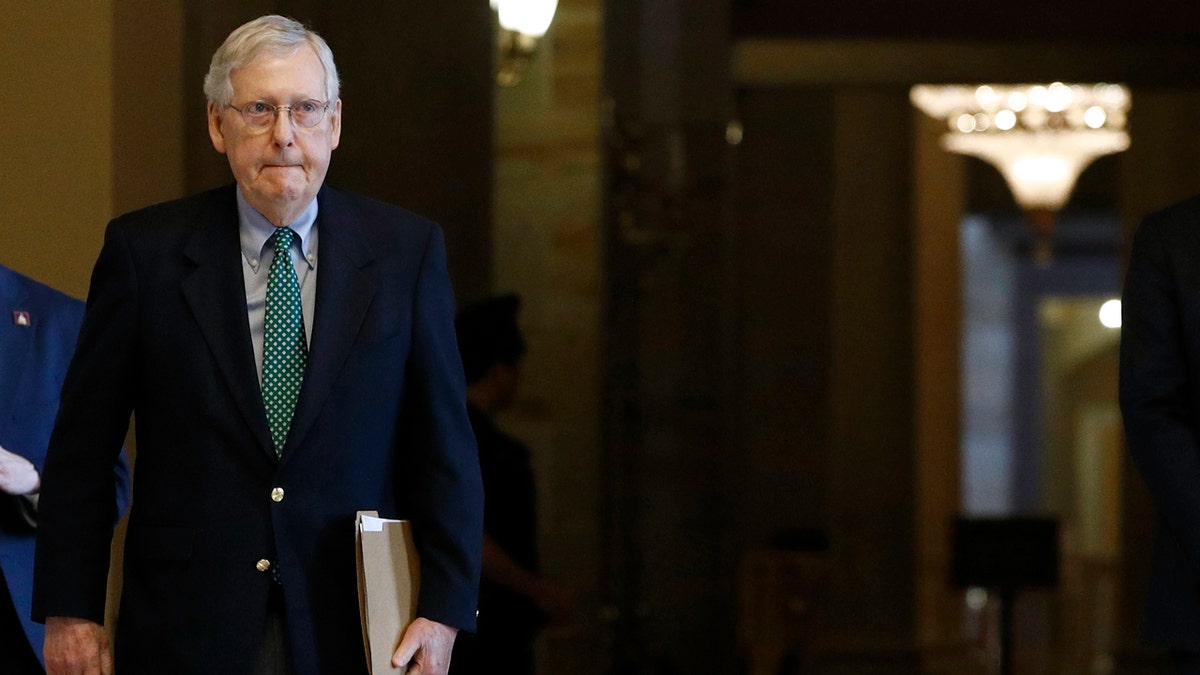Fox News Flash top headlines for September 8
Fox News Flash top headlines are here. Check out what's clicking on Foxnews.com.
A GOP-led Senate bill designed to protect small businesses during the COVID-19 pandemic may be a crucial point in whether lawmakers reach an agreement on extending economic relief before the 2020 presidential election.
As American families and small businesses suffer under both the pandemic and efforts to contain it, the July bill has emerged at the center of lawmakers' debates on relief.
MNUCHIN: GOP, PELOSI TO AGREE ON CONTINUING RESOLUTION TO AVOID SHUTDOWN, AS STIMULUS TALKS STALL
Senate Bill 4317, or the SAFE TO WORK Act, was co-sponsored by Senate Majority Leader Mitch McConnell, R-Ky., and Sen. John Cornyn, R-Tex., to discourage "insubstantial lawsuits relating to COVID–19 while preserving the ability of individuals and businesses that have suffered real injury to obtain complete relief."
Critics however, argue that the legislation would provide immunity from suits under the guise of protecting health care professionals and precluding unsubstantiated COVID-19 claims.
"In its entirety, the preponderance of provisions contained in the bill is nothing more than a business liability shield," University of New Haven economics and business analytics professor Brian Marks argued in a Monday op-ed in The Hill.
The law, he said, is an attempt to distract from the issue. The "health care professional is trying to provide care and treatment for COVID-19, and the liability shield could result in the spread of COVID-19 because of the moral hazard problem created by the shield."
Marks said the law would shift responsibility and COVID-19 risks from firms and companies to employees and consumers and that the result would "not necessarily be conducive to a safe and secure work environment."
"This bill is misguided, misdirected, and misnamed if the objective is to provide a safe and secure environment," Marks concluded.
However, a Senate leadership aide rejected Marks' argument, telling Fox News on Tuesday that claims the bill "provides what is tantamount to absolute immunity from COVID-19 related lawsuits under the pretense of precluding unsubstantiated COVID-19 claims and protecting health care professionals" are false.
"One of the central points of the McConnell-Cornyn bill is to create a federal cause of action for medical malpractice suits. The bill is expressly authorizing those suits," the aide said.
Senate Minority Leader Chuck Schumer, D-N.Y., had similar criticisms during an appearance on MSNBC in July, and both The Washington Post and Politifact gave him negative marks.

Senate Majority Leader Mitch McConnell. (AP Photo/Patrick Semansky) (Associated Press)
McConnell, Cornyn and Senate Republicans backing the bill say the provisions are crucial to facilitating the U.S. reemergence from the pandemic-linked recession or "economic storm."
McConnell has previously told CNBC that he would not bring up a coronavirus aid bill in the Senate unless it includes liability protection.
With Democrats still pushing for the $3 trillion HEROES Act passed in the Democratically controlled Hosue and Republicans looking for a price tag no larger than $1 trillion, White House Chief of Staff Mark Meadows told FOX Business' Maria Bartiromo Tuesday morning that he was optimistic that something would get passed before the November election.
Treasury Secretary Steven Mnuchin said on "Fox News Sunday" that while House Speaker Nancy Pelosi, D-Calif., is refusing to negotiate a new deal unless Republicans are willing to spend at least $2.5 trillion, she has agreed to a continuing resolution that will keep the government from shutting down.
In a statement released later Tuesday, McConnell announced Republicans would introduce a new, targeted proposal and that he would be moving immediately to set up a floor vote.
"Everything Speaker Pelosi and Leader Schumer have done suggests one simple motivation: They do not want American families to see any more bipartisan aid before the polls close on President Trump’s re-election. They have taken Americans’ health, jobs, and schools hostage for perceived partisan gain," McConnell said.
CLICK HERE FOR THE FOX NEWS APP
While little is known about the future of COVID-19 litigation and The Wall Street Journal says employers are "rarely … found liable for employee deaths tied to the workplace," legal experts have warned the trend could reverse because early liability lawsuits filed against employers are focused on whether employers followed state and federal guidelines.
Hunton Andrews Kurth, a multinational law firm that primarily represents corporate clients, reported that as of late August about 499 employment and labor lawsuits claiming that employees were exposed or potentially exposed to the new coronavirus had been filed.
At the end of the month, there had been 4,655 legal complaints filed since Jan. 30 — the date the first legal complaint in the database was filed — relating to the disease.
Although the trend has notably increased, about 16 million civil lawsuits were filed in state trial courts in 2018, according to the Conference of State Court Administrators and the National Center for State Courts.















































